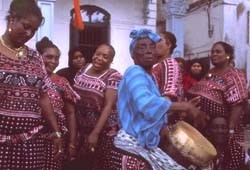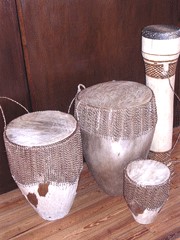Resource 1: Stories of the Venda drum
![]() Background information / subject knowledge for teacher
Background information / subject knowledge for teacher
The story of the sacred Venda drum
Long, long ago, the ancestor god called Mwari gave the Venda people a sacred drum called the Ngoma Lungundu. In these ancient days, the ancestors of the Venda lived in Zimbabwe. One day, they received a divine message that they should pick up their sacred drum, the Ngoma Lungundu, and move south.
This magic drum was large and heavy and had to be carried by many men. In order to preserve the power of the drum, it could never touch the ground. When struck by the chief it could cause fog, hail, rain, thunder or lightening. At times, the great god Mwari would play the drum himself. At these times the drum would appear to be playing itself. Enemies fled in terror, fainted or died when they heard its powerful rhythms.
These powers helped to protect the ancestors of the Venda people during this journey and eventually they arrived where they live today in the northern parts of South Africa. Here, there is a lake called Fundudzi that is sacred to the Venda people. Many years ago, a great hero of the Venda people, called Thoyo ya Ndou, disappeared into this lake, taking with him the magical drum. Most people think that it has never been seen since, but some believe it lies guarded and hidden in a cave. Thoyo ya Ndou, or Head of the Elephant, was greatly admired because he united the Venda people and there was peace and prosperity. Ever since he disappeared, many say there has been disagreement and strife between the royal Venda families.


The python
In the Limpopo Province there is a beautiful lake called Fundudzi. The Venda people regard this as a very important, sacred place as they believe there is a great, white python that lives at the bottom of Fundudzi. This python is the god of fertility. In other words, he ensures that there is enough rain and plentiful food. He also makes sure that people are healthy and have many children.
Long ago, this god lived on the land. He had a beautiful patterned skin and married two human wives, one old and one young. It happened that he visited these wives each day, late at night. He also visited their huts when they were busy working in the fields. So they never saw their husband or knew what he really looked like.
One day, the younger wife grew curious and decided to come back from the fields early and peep through the window. She was horrified to see that her husband was a fat python and screamed in horror. The snake god took fright and slithered away into the lake. From then on there was drought and famine in the land. The animals died and there was not enough water for the crops to grow.
Nobody knew what had caused this disaster and the elders met to have discussions about the problem. Eventually the young wife confessed what had happened. They begged her to help them restore fertility to the land. Early one morning, she took a pot of the finest beer and waded into the water. The men played their reed flutes in honour of her courage. She walked deeper and deeper into the lake until the water covered her head, and was never seen again.
After this, the rains returned and the famine stopped. To this day, Venda kings and traditional healers go down to Lake Fundudzi and pour beer into the water. They believe if the beer sinks, it is a sign of the python god’s pleasure and acceptance of their gift. In Venda culture, young people attend a special school of initiation. This prepares them for their role as a married woman or man in society. Young people learn the domba dance when they attend the dombani or traditional school. Before the domba dance begins, the master of the dance calls out: ‘Tharu ya mahbidighami!’ (‘The python is uncoiling!’) When performing the dance they form a long line and ‘snake’ around a sacred fire.

3. Learning from performance



